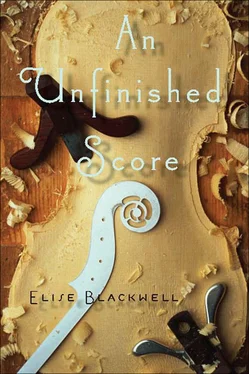She extracts the booklet inside the case, the one Alex signed, Everything for you . Ben, though a reader of liner notes, has never mentioned the inscription. Suzanne has turned this fact over, wondering whether Ben knew and decided to allow her the affair as the price of keeping her or merely from indifference — or whether the idea never occurred to him and he assumed this was how the great conductor signed albums for all his fans. Ben has never asked her what it was like to play under Alex, never asked whether they spoke of more than the music at hand, never asked, even, if he was a good conductor. Though this is just one of the many closed doors between them, she has always resented him for not noticing, or pretending not to, and hated herself for not knowing which and not being strong enough to ask.
It is the former, she tells herself now: he simply did not notice. And it is true that Ben has never held much interest in mainstream performance, even across the years it paid their bills, even though it is how Suzanne spends what time she spends away from him. He never asks. Of course he wouldn’t notice.
When she confessed to Alex that she kept the CD among their others, in the living room, he laughed. “You are no Mata Hari,” he said. “You obviously haven’t done this before.”
No, she told him, she had done nothing of the kind before. Afraid of igniting his easy anger, yet also afraid of the answer that might follow, she did not ask him how many times he had done something of the kind.
The night of her lover’s death — already she thinks of it this way — Suzanne drinks harsh whiskey and cries and holds the CD in its case as though the plastic square holds the coded answer to life’s hardest questions. Her fatigue fights the clicking roll of the digital clock that sits atop a row of books in the bookcase as she tries to stay awake past midnight. She wants to feel every minute of this day. Alex was alive this morning, and that will never be true again.
It is three in the morning when she wakes in the chair, strangely bent and groggy but never forgetting, not for a sweet second, that Alex is dead, that this day does not begin with him alive. She finds her way to the bed she shares with Ben and presses herself down into sleep. She barely stirs when he slips from the room early, just as the grayest morning light seeps through the crooked slats in the blinds, leaving with gym bag and briefcase. She slides back into sleep, into a dreamy world that is beautiful because in it Alex breathes, touches her, tells her stories, and commands her to play the viola for him.
When Suzanne does rise she has only shaky legs for support. As on most mornings, Adele is up but Petra is not. Through the blunt headache and the whiskey aftertaste that survives toothpaste and mouth-wash, she fixes Adele’s favorite breakfast of oatmeal with walnuts and too much brown sugar. She sits with her as she eats, a few quiet moments before Adele withdraws to dress for school.
Petra shuffles into the kitchen wearing flannel pajama pants and a tank top. She stands at the coffee maker, back to Suzanne, jumping up and down with her hands in the air, blond braid shimmying on her back like a fat, happy snake. Even in the morning Petra jangles. She pours herself coffee and spins around, revealing the kind of good looks that Suzanne grew up wanting: tall blondness, skin like a white peach, cheekbones giving structural elegance to small features. When Petra plays her violin, she bows long stretches with her eyes closed, and her lashes are so long and thick that they make fringed fans visible across the room despite their pale color. When the eyes fly open, always without warning, Suzanne is startled, every time, by their sea blue, by Petra’s old-fashioned Swedish beauty. Yet when Petra stands to her full height, bends at the waist and not the knees to return her violin to its case, her look is thoroughly modern.
Sometimes when Suzanne looks at Petra, she wonders why she doesn’t hate her on sight, as many women do. It helps that Petra thinks she looks common. Though perfectly posed when holding her violin, without her instrument she is no more coordinated than a cloth doll, and Suzanne loves her for her awkwardness. Many men look at Petra as if at cased jewelry, with appreciation for a beautiful thing they have no use for. When a man approaches the two of them at an after-concert reception, he speaks first to Suzanne, turns to Petra, and then, in a shift once surprising that now feels inevitable, refocuses his attention on Suzanne until she excuses herself to go home to her husband. There’s something about Petra’s blatant good looks that reveals Suzanne’s more obscured beauty. But the real reason Suzanne doesn’t hate or envy Petra is simple: Petra is her best friend.
“Hey,” Petra says, “I thought today was supposed to mark your return to composition. Why aren’t you composing?”
“Why aren’t you?”
“I have a kid.”
“Whose breakfast I just made.” Suzanne hears something in her voice under the humor, feels the hangover pressing into her forehead.
Petra blows on her coffee, then looks up. “What’s going on with you?”
“I’m sorry,” Suzanne says carefully. “I’m just annoyed with you for being right. Not composing is just one more thing to feel guilty about.”
Petra hugs her loosely, mug still in hand, and kisses her temple. “It’s the only thing you have to feel guilty about. Thanks for getting Adele in gear.”
Biographical histories of music include few nods to female composers, and it’s something Petra and Suzanne have talked about since they met at the Curtis Institute. There are often chapters on Nadia Boulanger and her tragic sister Lili. And music historians like to praise the Italian nun Isabella Leonarda or weigh in on whether or not Cécile Chaminade’s salon compositions — hugely popular in their day but mostly derided since — constitute a real contribution to music. Yet for the most part histories of the great composers are the stories of men’s lives, the women cast as helpmates, muses, hindrances, nursemaids, business managers, performers, or lovers.
Petra always argues that this treatment stems from the same prejudice that led the music world to claim that women could never be great trumpet players due to the size of their lungs — a belief overcome only by hard evidence: anonymous auditions played behind opaque screens. But Suzanne knows, and Petra has admitted, that women have written far less music than men and, when they have composed, it has often been with less dedication.
Petra flops a hand on her shoulder. “Don’t pull a Minna Keel on me.”
It was Petra who told Suzanne the story of Minna Keel, who gave up composition — at the age of twenty and for forty-six years — to work in her mother’s business, marry, raise a prominent son, become politically active over the Spanish Civil War, and work for years as a secretary in the dullest of offices. There was family pressure guiding her choice — her series of choices — and perhaps a lack of encouragement, though she had male teachers who supported her. Ultimately it was a man who convinced her to compose again: a musical examiner who’d come to test one of the third graders she gave piano lessons, after her retirement from office work. Her sixties is when she really began to write.
It was a story that sometimes depressed Suzanne and sometimes gave her hope. It’s not too late for her to write music, not even close — that’s the moral she wants to take away. The loss of Lili Boulanger’s music is the responsibility of her time and place, of her own traitorous body, of bad luck or fate. But what about the loss of forty-six years of Minna Keel? Whose fault is that?
Читать дальше












